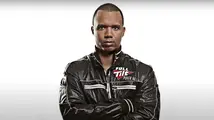Can you imagine the big prestigious tournaments without Phil Ivey? Or else, can you imagine the WSOP without Phil Ivey? Let's go back together with this article to 2011, when Phil decided not to play the WSOP in protest.
Full Tilt Problems
When Phil Ivey didn't show up for the $25,000 WSOP Heads-up Championship in 2011, it raised a lot of questions among players. However, these were cleared up by Phil himself a few hours after that on his Facebook profile, where he posted a statement that he would not be playing any WSOP tournaments that year, and that he was suing Tiltware (the company behind Full Tilt Poker) for $150 million.
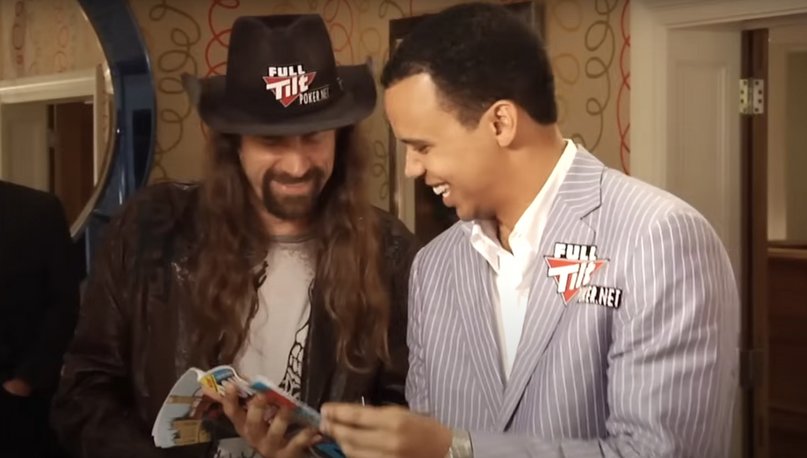
In April 2011, the FBI accused the three largest online poker companies of defrauding US banks by processing billions of dollars in payments that were disguised as payments to hundreds of non-existent online merchants. The U.S. government subsequently banned anyone in the United States from playing Full Tilt Poker for real money. Despite claims by prosecutors that players would get their money back, Phil Ivey claimed that $150 million was still unaccounted for.
Phil Ivey gave the following statement on the matter, "I am deeply disappointed and embarrassed that Full Tilt players have not been paid the money owed to them. I am equally embarrassed that as a result many players are unable to compete in tournaments and have suffered economic damage. I don't play the WSOP because I don't believe it's fair to compete when others can't compete. I am doing everything I can to find a solution to this problem as quickly as possible. My name and reputation have been dragged through the mud because of the inaction and indecision of others, and on behalf of all poker players, I refuse to remain silent any longer. I have electronically filed a lawsuit against Tiltware regarding outstanding player accounts. The public certainly knows that this was not an easy decision for me to make. I wholeheartedly refuse to accept inaction when it comes to repaying players, and I am angry that the people who have supported me throughout my career have been treated so poorly."

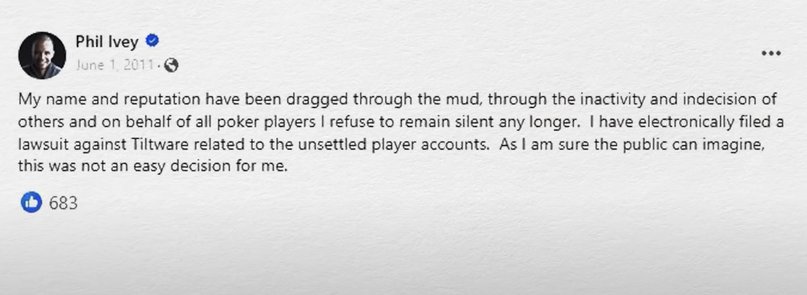
Lawsuit for $150 million
Phil wanted to use this move to show that he was distancing himself from the problems that Full Tilt had. His lawyers said in their lawsuit that after the Tiltware contract was signed, no one from the company informed Phil that Full Tilt used fraudulent methods to avoid bank restrictions on transferring funds, as the Justice Department claims. They also said that, according to the DOJ, online poker companies were repeatedly warned that their conduct was illegal in the U.S., but Ivey was allegedly not informed of those warnings. Phil Ivey also said in the lawsuit that progressives are linking professionals playing under the Full Tilt brand to the whole issue and expressing the opinion that Ivey and co. should pay the money owed to the players personally. Based on these allegations, the lawsuit alleged that Ivey suffered public ridicule and loss of personal and professional reputation as a result.
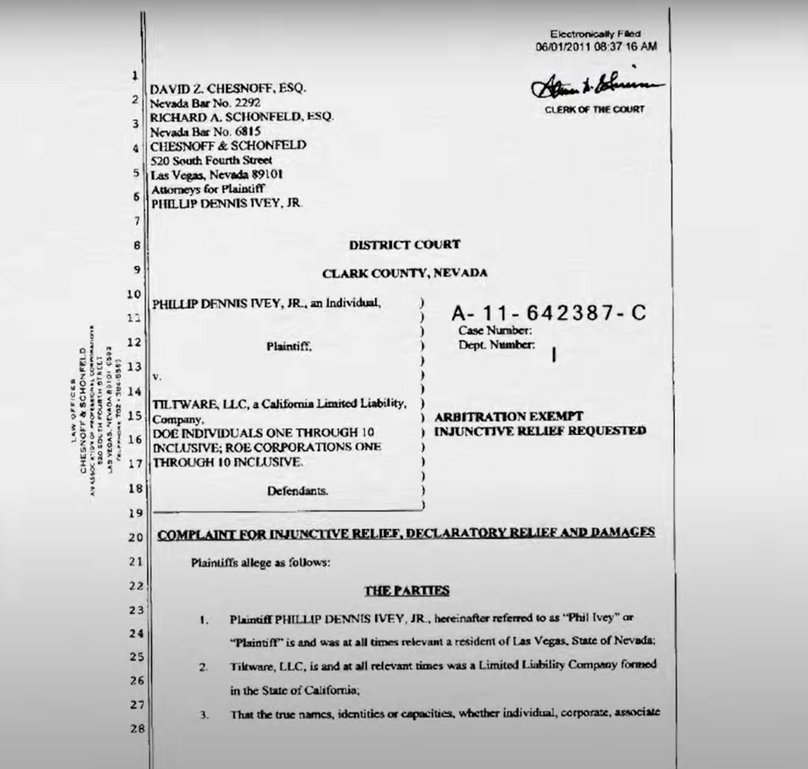
Ivey was prohibited by his contract with Tiltware from playing on other platforms, and so he asked the court to have that prohibition lifted because doing so would deprive him of his livelihood. He initially asked Full Tilt to do so, but Full Tilt refused to comply, so Ivey filed a lawsuit seeking at least $150 million in damages. However, the company said that they were very short of cash and that their cash was still declining. What was most interesting about the whole lawsuit was the fact that Ivey wanted the freedom to play on other sites, but he also wanted to keep his shares in Full Tilt.

The owners of Full Tilt commented on the lawsuit that Ivey has a selfish mind, and does not speak for anyone in the poker community, but only for himself. According to them, he had a moral obligation to do everything he could to do no harm to Full Tilt, from which he was making a huge profit. However, his lawsuit has hurt the companies a lot, especially when they were looking for partners to lend them money to meet their obligations. This lawsuit, from a key figure in the gaming industry, made it very difficult for the company to find a new partner.
Loan 10 million
It was later discovered that Phil had borrowed over $10 million in 18 loans from Full Tilt, of which he was only able to repay about $4 million. These facts were discovered through transactions in his account.
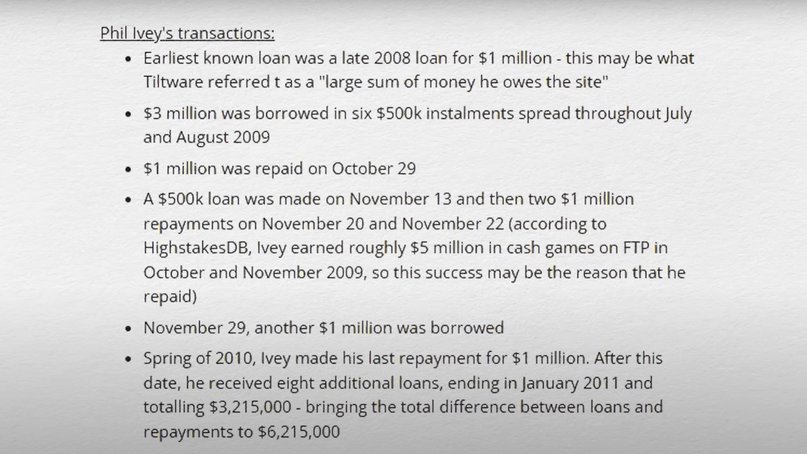
Following these revelations, a wave of criticism was launched at Phil's head. For example, Andrew Robl also expressed his opinion: "Phil Ivey was one of Full Tilt's major shareholders and profited from his business more than almost anyone else. If he cared about the players, he would have committed to returning every penny of the millions of dollars he made on Full Tilt to the players just as Tom Dwan did." Mike Matusow also took a stand against Phil, stating, " What a big crock of shit from a guy who only cares about himself and not the players."
Full Tilt also weighed in on the topic again, stating, "Phil Ivey's baseless lawsuit is about helping only one player, and that's himself. In fact, Mr. Ivey was invited, and has refused to take any action that could have helped the company, including repaying the large amount of money he owes the site. Tiltware doubts that Mr. Ivey's frivolous and self-serving lawsuit will ever come to trial, but if it does, the company looks forward to presenting facts that prove that Mr. Ivey is putting his own financial interests ahead of the interests of the players."

Download the lawsuit
On June 30, 2011, it was revealed that Ivey had voluntarily withdrawn his lawsuit. Ivey's lawyer, made a statement explaining that Ivey intends to withdraw his lawsuit because he believes that Full Tilt is taking steps to ensure that players are paid. There was information circulating that Full Tilt had entered into an agreement with a number of European investors where one of the clauses was for Ivey to withdraw his lawsuit, and so he did.
Although Phil Ivey's lawsuit could have seriously devalued the company's assets, Ivey was eventually appointed to the company's board of directors along with Andy Bloch and Phil Gordon. The group led by Phil Gordon and his counsel believed that the previous board members had been actively involved in creating the nine-figure deficit. After a majority vote of the owners, the original board members were to be removed and Ray Bitar was to become Full Tilt's new Chief Executive Officer (CEO). Phil Ivey returned to poker after these difficulties in November 2011 when he played tournaments at the APPT Macau.
Source - Pokernews, Facebook, Youtube Poker Bounty channel, WSOP


